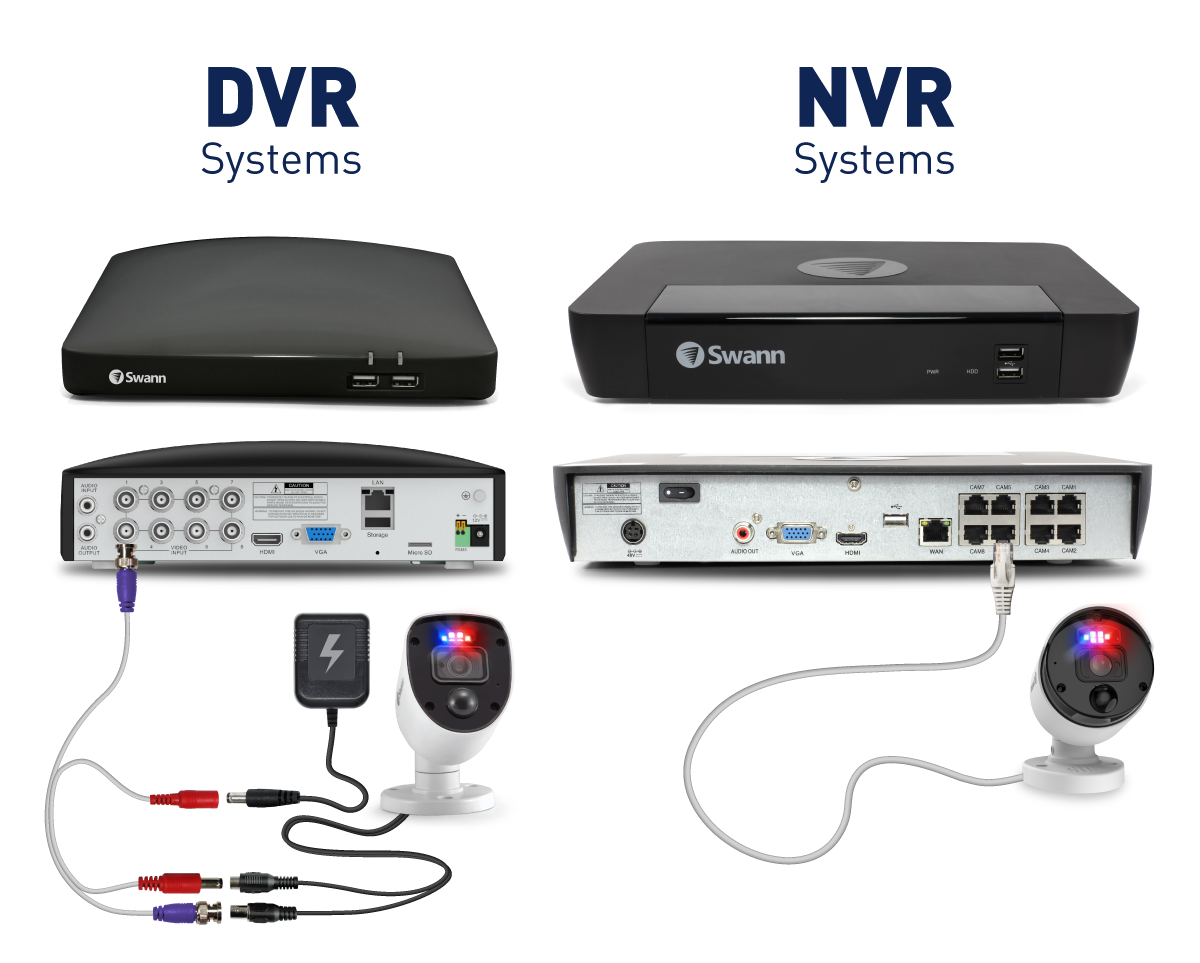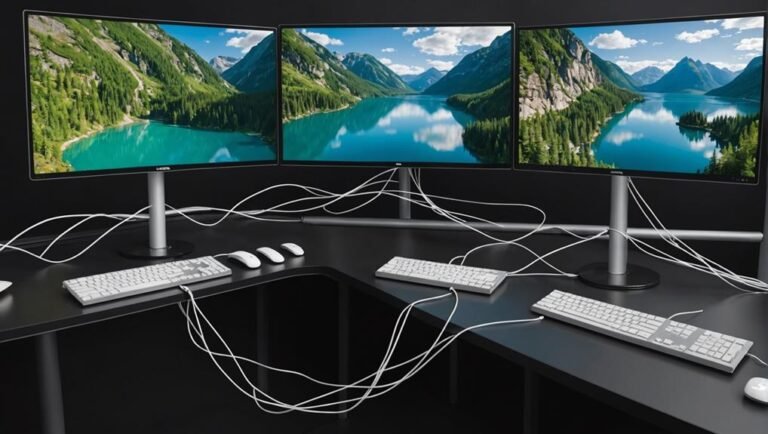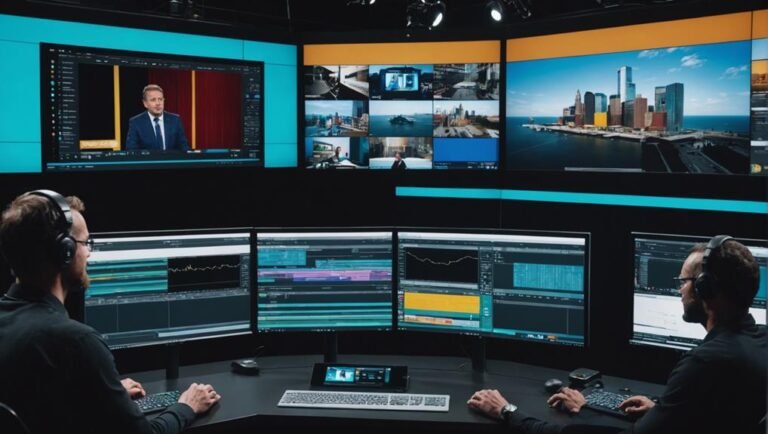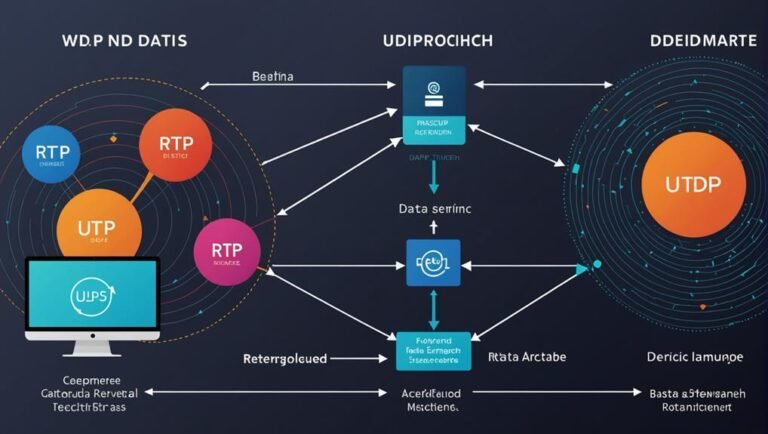NVR systems use IP cameras and network bandwidth, while DVRs stick with analog cameras and coaxial cables. NVRs deliver superior video quality thanks to advanced compression standards and high-resolution IP cameras. For installation, DVRs are simpler with straightforward coaxial setups, whereas NVRs might need complex network configurations. NVR systems offer better future scalability, seamlessly integrating more cameras as needed, unlike DVRs that are bound by fixed channels. Although NVRs may have a higher upfront cost, they prove valuable with advanced tech and flexibility. Curious about which system truly fits your setup and budget? Keep exploring to find out.
Technology and Functionality
Understanding the differences in technologies and functionalities between NVR and DVR systems is crucial. NVR, or Network Video Recorder, utilizes IP cameras to capture and transmit video data through network bandwidth. These systems typically offer more flexibility since they can connect wirelessly or via Ethernet cables, allowing for easier installation in various locations without being tied to a central recording device. On the other hand, DVR, or Digital Video Recorder, depends on analog cameras and coaxial cables, which can restrict camera placement and system expansion options.
A standout feature of NVR systems is their remote accessibility. With an NVR, you can conveniently access your video feeds from any internet-enabled device, giving you the flexibility to monitor your property from virtually anywhere. In contrast, DVR systems often require additional hardware or software to provide similar remote viewing capabilities. This convenience of access makes NVRs especially attractive if you are frequently on the go or have multiple properties to oversee. Therefore, if freedom and flexibility are your priorities, NVR systems may be the ideal choice for you.
Video Quality
When it comes to video quality, NVR systems generally outperform DVR systems due to their use of high-resolution IP cameras. You’re not just getting a clearer picture; you’re gaining the freedom to capture every detail—whether it’s a license plate or a face in the crowd. NVRs leverage advanced image resolution to provide sharper, more precise visuals. In comparison, DVR systems rely on analog cameras, which can’t match the high-definition output of their digital counterparts.
What’s more, the compression standards in NVR systems are typically more advanced. You’ll find H.265 and H.264 formats, which not only reduce file sizes but also maintain excellent video quality. This means you can store more footage without sacrificing detail, giving you the freedom to keep thorough records without worrying about storage constraints. On the flip side, DVR systems often use older compression standards like MJPEG or MPEG-4, which aren’t as efficient.
In essence, if video quality is your priority, NVR systems clearly have the upper hand. You get superior image resolution and more efficient compression standards, allowing you to capture and store high-quality footage without compromise.
Installation Process
Unlike the straightforward setup of DVR systems, installing an NVR system can be a bit more complex but offers greater flexibility and scalability. With a DVR, you usually deal with coaxial cables connecting each camera to the recorder, making the wiring process relatively straightforward. However, NVR systems use IP cameras that connect over your network, simplifying some aspects of wiring but introducing network configuration steps.
When setting up an NVR, you may face wiring complexity, especially if your network infrastructure isn’t robust. You’ll need to confirm that your network can handle the additional data load, and you might have to install new Ethernet cables or use existing ones efficiently. The benefit here is that you can place cameras virtually anywhere within your network’s reach, giving you more freedom in positioning.
Compatibility issues can also arise with NVR systems. Not all IP cameras are compatible with every NVR, so you’ll need to verify that your chosen components work well together. This means a bit of homework upfront, but the reward is a highly customizable and dynamic surveillance setup. With some initial effort, you can enjoy a flexible and modern security system that fits your unique needs.
Scalability
Scalability is a key consideration, and NVR systems generally offer more flexibility for future expansion compared to DVR systems. If you’re looking to grow your surveillance network, NVRs seamlessly integrate with your existing network infrastructure. You can easily add more cameras, upgrade data storage, and guarantee network compatibility without overhauling your entire system.
| Feature | NVR Systems | DVR Systems |
|---|---|---|
| Data Storage | Flexible and expandable | Limited to built-in hard drives |
| Network Compatibility | High | Limited |
| Camera Addition | Simple and scalable | Complicated and restricted |
| Future-Proofing | Excellent | Limited |
| Setup Complexity | Moderate | Simple |
Imagine the freedom to expand your security footprint as you see fit. With NVR systems, you’re not locked into a rigid structure. The ability to scale up by just adding IP cameras means you won’t have to worry about outgrowing your current setup. Plus, since they operate on your existing network, there’s no need for extensive rewiring.
On the other hand, DVR systems can be a bit restrictive. They usually come with a fixed number of channels, limiting how many cameras you can add. As your need for surveillance grows, you may find that a DVR system just can’t keep up with your evolving requirements.
Cost and Value
Many people find that the initial cost of NVR systems can be higher, but the long-term value often outweighs the upfront expense. When you invest in an NVR system, you’re usually paying for advanced technology, better quality video, and more flexibility. While DVR systems might seem cheaper at first, they often come with hidden costs, like monthly fees for cloud storage or additional hardware.
One major advantage of NVR systems is their superior storage capacity. You can easily add more hard drives or upgrade existing ones to meet your needs, giving you the freedom to store as much footage as you want without worrying about running out of space. On the other hand, DVR systems usually have limited storage options, which could force you into monthly fees for external storage solutions or frequent hardware upgrades.
When it comes to value, think long-term. NVR systems often provide better scalability and integration options, making them a more future-proof investment. You won’t be constantly shelling out money for extras, and the flexibility in storage capacity means you can tailor the system to fit your needs perfectly. So while the initial costs might be higher, the freedom and flexibility you gain could be well worth it.
Frequently Asked Questions
Can NVR and DVR Systems Be Integrated With Smart Home Devices?
Imagine your home as a symphony. Smart integration guarantees harmony, but not all instruments (NVR and DVR) play well together. Device compatibility varies; newer NVR systems often sync better with smart home devices, offering more freedom.
Do NVR and DVR Systems Offer Cloud Storage Options?
Yes, both NVR and DVR systems can offer cloud storage options. However, you’ll need to take into account cloud pricing and storage capacity. You’ve got the freedom to choose plans that fit your budget and needs.
What Are the Cybersecurity Measures for NVR and DVR Systems?
When contemplating cybersecurity for NVR and DVR systems, you’ll want to make sure they use strong encryption protocols and receive regular firmware updates. Don’t let your system be a sitting duck in the Wild West of cyber threats!
How Do NVR and DVR Systems Handle Audio Recording?
When considering audio recording, you’ll find NVR systems usually offer better audio quality due to advanced IP cameras. Proper microphone placement is essential for both systems, but DVR systems often lag in audio clarity compared to NVRs.
Are NVR and DVR Systems Compatible With Mobile Monitoring Apps?
Imagine checking your security from anywhere. Yes, both NVR and DVR systems are compatible with mobile monitoring apps. You’ll enjoy mobile compatibility and remote access, giving you the freedom to monitor your property anytime, anywhere.



